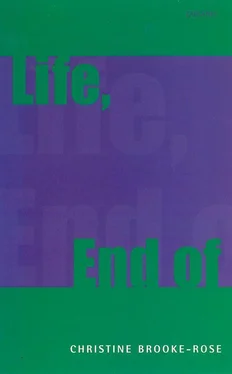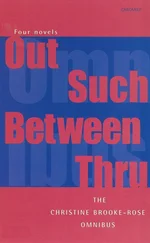Christine Brooke-Rose - Life, End of
Здесь есть возможность читать онлайн «Christine Brooke-Rose - Life, End of» весь текст электронной книги совершенно бесплатно (целиком полную версию без сокращений). В некоторых случаях можно слушать аудио, скачать через торрент в формате fb2 и присутствует краткое содержание. Год выпуска: 2012, ISBN: 2012, Издательство: Carcanet Press Ltd., Жанр: Современная проза, на английском языке. Описание произведения, (предисловие) а так же отзывы посетителей доступны на портале библиотеки ЛибКат.
- Название:Life, End of
- Автор:
- Издательство:Carcanet Press Ltd.
- Жанр:
- Год:2012
- ISBN:9781847775726
- Рейтинг книги:5 / 5. Голосов: 1
-
Избранное:Добавить в избранное
- Отзывы:
-
Ваша оценка:
- 100
- 1
- 2
- 3
- 4
- 5
Life, End of: краткое содержание, описание и аннотация
Предлагаем к чтению аннотацию, описание, краткое содержание или предисловие (зависит от того, что написал сам автор книги «Life, End of»). Если вы не нашли необходимую информацию о книге — напишите в комментариях, мы постараемся отыскать её.
by a master of experimental novels finds the author reflecting on her old age and its effects on her writing. As she reflects on her own career, her experiments with narrative, and on the narrative she writes here, she ultimately reasserts herself and accepts the life behind her.
Life, End of — читать онлайн бесплатно полную книгу (весь текст) целиком
Ниже представлен текст книги, разбитый по страницам. Система сохранения места последней прочитанной страницы, позволяет с удобством читать онлайн бесплатно книгу «Life, End of», без необходимости каждый раз заново искать на чём Вы остановились. Поставьте закладку, и сможете в любой момент перейти на страницу, на которой закончили чтение.
Интервал:
Закладка:
Valérie shows them where everything is. This will give her some welcome relief, for she soon comes three times a day for the simple meals, paid double for those hours in grateful appreciation of her finding time in her busy schedule, and so as not to abuse of her kindness. A nurse comes twice a day for the toilet. All very efficient.
So are they. It’s good to see them, both much younger but prematurely white-haired. Barbara’s is thick, glossy, and brilliantly white, his less white because less thick. Creating both admiration and a touch of envy in the patient, permanently pale grey now, and never to go white, according to some hairdresser long ago. Barbara’s white hair is like a silver helmet, an angelic halo made of uncreated light.
They go out for a walk in the village and come back with slices of cake. They bring in three trays and eat in the bedroom, sitting on uncomfortable chairs. The prodigal wheeled table comes into its own, whatever its predeterministic status. But now wheeled by others. From table to tray to trolley to templates. Recalling the coffin sequence.
Perhaps the insistence on taking them out to dinner is really due to the absence of the pink table and benches. Perhaps not, since the tray-habit long precedes the move of the office downstairs. But only for one person. Once again, is the dinner out of generosity or the desire to impress?
But the mood is jovial, untouched by the invalid’s over-analyses or, more rarely at last, too much talk of her ailments. Except once, when Barbara goes out for another walk and the conversation turns to writing. This writing. Another ailment in fact.
Writing. Now at an end, in both practice and theory, since the desk or computer position is too cardio-vasco de Harmer, lacerating the chest. But secretly taken up again after discovering the comfortable way of using the armchair, for the joy of bristling up words again. just for fun. And perhaps therapy. Or here in bed, more precarious with just the board and no chair-arms. This text is described, owned up to rather. After all Tim is an ex-editor, so it feels quite natural. Two huge doubts are mentioned, (a) and (b) the two most visible themes: are they a bore? Is the treatment light enough? He listens attentively. Or does he? Shyly the question is asked. There are only five chapters or sections, would he read them down in the guest-room? Of course.
The next day something quite out of ken occurs. Barbara is there, and yes, he’s read it. He then goes gradually into a soliloquy, Dan-like in length and slowness, but not Dan-like in underlying wisdom and information. He vanishes into a long self-engrossed description of how he reads a text, how he seeks for the structure of distributing information. All of which can apply to any text. He never once refers to this text, nor to the specific doubts expressed, nor does he proffer the criticism and counsel hoped for, not even yes or no.
Silence and deep astonishment follows. Barbara gazes at him and smiles. Clearly she knows him well and loves him, explaining that he’s always like that, it’s his way.
Barbara is a schoolteacher who loves her work but has just resigned in protest at the way education goes on in England. She is courageous, but still in désarroi , it’s her life’s work she’s giving up. And she certainly understands what has occurred.
Laughter remains the well-shared tone, especially since he sits head in hand as if in agony as he goes through his soliloquy but looks up again as Barbara talks. This flagrant withdrawal into the self is so unlike him that it seems to mean only one thing: a friendly way of saying it’s all a bore, stop it. So why not say so as asked? As with the doctor. But here asked by someone welcoming and inured to criticism. Surely we’re beyond that.
Or it could mean look into yourself. A mirror. You too withdraw into yourself.
But tell me, did you at least enjoy it?
An idiotic question, after that performance, and not even meant. A direct question would be apter, what does he think of (a) or (b)? But in view of the possibly friendly way of hiding that, it can’t be asked. He merely says that this is his way of reading and his right, and all part of Reader Response Theory, which flourished in the 70s. Already then a distant outcome of Wimsatt’s The Intentional Fallacy , the author’s intention invalidated, so out goes the author, fine, but taking no account of Wimsatt’s twin essay The Affective Fallacy , expressing justified doubts in the dangers of placing all interpretation with the Reader, and not on the Text. But that’s the old New Criticism, long out of fashion already by the time of Reader Response, itself much relativised. All the same, no version of Reader Response Theory, taught among others for twenty years, not even Ingarden’s early work on the textual gaps, concerns the personal mechanics of reading in general without reference to a text or several.
The conversation shifts. Everything ends in lightness and humour, as with Dan and Rebekah. He is a gentle loving man, and very generous with his time. But the surprise remains. Yes of course he’s entitled not to reply. But why not simply say he has no views on (a) and (b)?
His card of thanks is affectionate, and again he gently defends his right to Reader Response Theory. And adds, somewhat irrelevantly, the Yeats quote, How tell the dancer from the dance?
In a flash it’s not so irrelevant. It’s a pertinent response after all, not to the questions asked but to the deeper theme, the deeper texture. He does after all pinpoint the painpoint. A small reflection. A calm wise joy.
Clearly Barbara better understands him and his way of thinking. But that’s as it should be. She is a belle-amie.
7
Heredotage. The quest for brain activity to compensate for the body. For constant intake as opposed to output.
With laptop lapdog topdog. But alas not so, the computer is a desk one, heavy, unmovable.
But what is intake for in the end? Is it just gigo?
The old have to think so hard and continuously of every physical detail, physical movement, it’s not surprising they develop a senile self-centredness. How to separate the physical from the moral, philosophical, psychological? The dancer from the dance? The author from his story? What is central and what peripheral? The peripheral polyneuritis feels totally central, responsible for all the burning flinching stumbling falling and for the half bent walk when picking up the cordless phone or Black holes, says a tele-scientist, can, in this case, now forgotten, become creative. Can a black hole become an ivory tower?
But that’s no use. The only way is a long training, not so much for the end as a black hole, but for the little life remaining, or what’s still to learn, left, it seems, a little late, to sort out the trivial from the essential by self-slotting, and all the rest.
And yet there is what now feels like an equally long parallel life of generous time and help freely given, much love, much warmth, much laughter, money-gifts not loans, to many many now forgotten. But parallels rarely meet. Anything freely given seems to lead more often to resentment than to love. Overdoing it perhaps, curiously compensating for an apparently selfish life because unsacrificed to husband and children. For mysteriously time can always be found during an active life and never at all in an inactive one, wholly taken up with new incapacities and slow new movements to learn. As if this second life were separate and gone elsewhere, since all these ailments hit. Perhaps it is this second life that is constantly being annulled. Or rather, gone into hiding whenever contemporary existence is annulled. What in fact is being annulled? The newly contracted identity as Old Person? Or the Older (Previous) Person?
Читать дальшеИнтервал:
Закладка:
Похожие книги на «Life, End of»
Представляем Вашему вниманию похожие книги на «Life, End of» списком для выбора. Мы отобрали схожую по названию и смыслу литературу в надежде предоставить читателям больше вариантов отыскать новые, интересные, ещё непрочитанные произведения.
Обсуждение, отзывы о книге «Life, End of» и просто собственные мнения читателей. Оставьте ваши комментарии, напишите, что Вы думаете о произведении, его смысле или главных героях. Укажите что конкретно понравилось, а что нет, и почему Вы так считаете.












